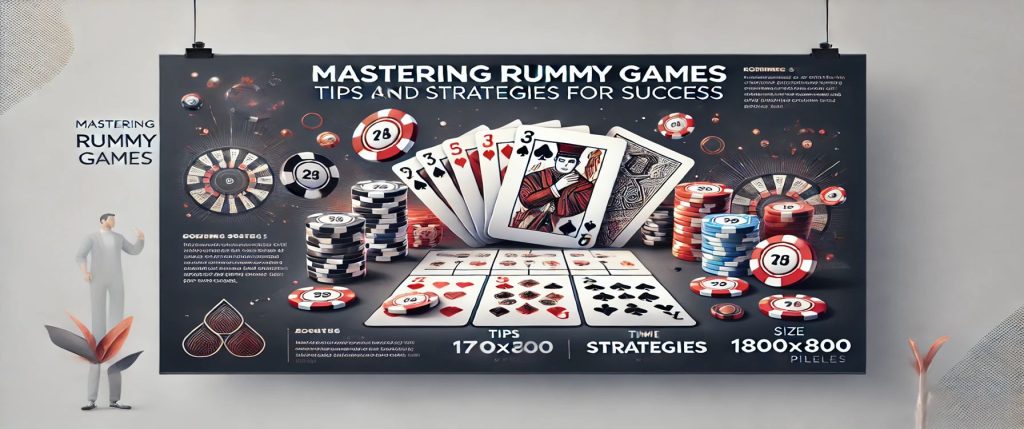
Getting the Hang of Rummy: A Complete Guide to Success Rummy is a fascinating card game that has become very popular all over the world. Players of all ages find it appealing due to its combination of skill, strategy, and a little bit of luck. Anyone wishing to explore this fascinating world must have a basic understanding of rummy games. The fundamental objective of rummy is to combine all of the cards into legitimate combinations by creating sets & sequences from a hand of cards.
Gin Rummy, Indian Rummy, and Kalooki are some of the different formats in which the game can be played; each has its own set of rules and subtleties. Being familiar with these variations is essential because they have a big impact on strategy and gameplay. Players need to understand the significance of card values and how they affect scoring in addition to the fundamental rules. Players may approach their hands differently in many rummy games because face cards are worth more than numbered cards. Gaining an understanding of the scoring system is essential for creating a winning strategy because it enables players to decide when to hold onto or meld specific cards. Also, understanding the importance of draws and discards can help players gain insight into their opponents’ strategies, allowing them to predict their moves and modify their strategies appropriately.
Players can position themselves for success in the cutthroat world of rummy by grasping these fundamental concepts. Success in rummy games depends on having a winning mindset, which includes both emotional fortitude and strategic thinking. It is important for players to have a positive outlook that accepts both wins and losses. This entails realizing that every game has a losing component and that every setback offers a chance for improvement. Players can prevent becoming unduly irritated or complacent, which could impair their judgment at crucial game points, by keeping a balanced viewpoint.
Players can critically evaluate their gameplay and make the required corrections for upcoming matches by adopting a growth mindset. Moreover, cultivating a winning mindset heavily relies on mental discipline. Because rummy frequently calls for extended periods of focus and strategic planning, players should learn to be patient and focused. This entails stifling the impulse to act on feelings or short-term results.
Rather, effective players take the time to carefully weigh their options, taking into account both their own hand and their opponents’ possible moves. Gamers can improve their decision-making abilities and raise their chances of winning at rummy by cultivating a disciplined approach to gameplay. In order to succeed in rummy games, players need to become knowledgeable about important tactics that can greatly increase their winnings. Making meld formations a top priority early in the game is one basic tactic.
Players can minimize the quantity of cards they must handle as the game goes on by concentrating on building sets or sequences right away. This proactive strategy puts pressure on opponents who might be having trouble forming their own melds while also streamlining gameplay. Players can also make better decisions about their own hands by monitoring which cards have been discarded, which can give them important information about the combinations that opponents are attempting to make. Effective risk management is a further crucial tactic. Gamers have to balance the chance of improving their hand against the possible advantages of drawing particular cards.
For example, it could be tempting to draw a card that could finish a meld, but it’s important to think about whether doing so could put one’s hand at higher risk if an opponent is on the verge of winning. Because of this strategic risk assessment, players must be alert & flexible during the game, modifying their strategies in response to changing table dynamics. Players can improve their overall gameplay and raise their chances of winning by becoming proficient in these crucial tactics. An essential component of playing rummy successfully is efficient card management. This entails not only arranging one’s own hand but also closely monitoring the cards that rivals are playing.
Players can swiftly spot possible melds and decide which cards to keep or discard when their hand is well-managed. Organizing their cards according to suit or rank will help players see potential combinations & weigh their options at each turn. This methodical approach can result in more efficient gameplay and speedier decision-making.
Players need to be skilled at watching what their opponents do in addition to managing their own cards. One important way to learn what melds opponents are attempting to form is to keep an eye on which cards are being drawn & discarded. An opponent may be working toward a low-point hand or be on the verge of winning if, for instance, they routinely discard high-value cards. Players can change their tactics by examining these patterns and focusing on their own hand’s advantages or preventing opponents from finishing their melds.
In addition to improving individual gameplay, this dual strategy for card management also promotes a better comprehension of the competitive environment. In rummy and other card games, where psychological strategies can frequently tip the scales in favor of one player over another, bluffing is a crucial component. Proficiency in bluffing necessitates a deep comprehension of human nature and the capacity to read the reactions of opponents. To instill doubt in their opponents’ minds, players can use a variety of strategies, such as discarding cards that appear valuable or keeping cards that appear useless for longer than is necessary.
Because of this strategic deception, opponents may misunderstand one’s intentions & end up making bad decisions based on false presumptions. Bluffing successfully, however, requires more than just lying; it also entails remaining credible during the game. A player runs the risk of losing the trust of their opponents if they bluff frequently without any real-world justification, which makes it simpler for others to figure out their strategies. As a result, players must balance strategic deception with authentic gameplay. Players can create an unpredictable environment that keeps opponents guessing & increases their chances of success by judiciously using bluffing tactics & occasionally disclosing their true intentions.
As players gain more rummy gaming experience, they might want to investigate more sophisticated strategies that can improve their performance even more. Card counting, which involves recording which cards have been played during the game, is one such strategy. Players can draw or discard cards based on probabilities more intelligently if they keep track of which cards are still in play.
One’s chances of creating winning combinations can be greatly increased by using this analytical method, which also permits greater strategic depth. Another sophisticated tactic is to change the game’s tempo. A skilled player is aware that pace can affect how their opponents make decisions. For example, players can create an environment of uncertainty by playing fast in some rounds and slowly in others.
This could cause opponents to make snap decisions or reconsider their tactics. This tempo manipulation is a potent tool for players trying to obtain an advantage in competitive rummy matches since it necessitates a sophisticated awareness of both one’s own and opponents’ gameplay styles. There are numerous variations of rummy, each with its own special set of rules & tactics. Players need to be flexible and open to picking up on the unique subtleties of each variation they come across in order to succeed in this varied environment. In Indian Rummy, for instance, players must form at least two sequences, one of which must be pure, using two decks of cards.
In Gin Rummy, on the other hand, players concentrate on creating sets and runs with fewer meld restrictions. It is essential to comprehend these distinctions in order to create strategies that work for every type of game. Also, depending on the particular variation being played, one can modify their gameplay style to greatly improve performance. Quick decisions and aggressive play, for example, may be more advantageous in faster-paced versions such as Speed Rummy than in slower formats where meticulous planning is necessary.
Players can remain competitive in any format and maximize their effectiveness across various rummy variations by understanding these differences and modifying their strategies accordingly. The game of rummy is always changing; new developments and trends appear frequently and have the potential to greatly affect gameplay dynamics. For any serious player hoping to keep a competitive edge, keeping up with these developments is crucial. By introducing features like real-time multiplayer options and sophisticated analytics tools that offer insights into player performance, online platforms, for example, have completely changed the way rummy is played.
Acquainting oneself with these technological developments can improve gameplay and create new opportunities for strategy development. Participating in online rummy communities can also yield insightful information about new trends and tactics that other players are sharing. By taking part in forums or social media groups, players can share advice, talk about new changes to rummy formats, and gain insight from other players’ experiences.
Players can make sure they are prepared to switch up their tactics and maintain their lead in this ever-changing card game market by staying involved in these communities and consistently learning about new developments in rummy gameplay. To sum up, learning rummy necessitates a multidimensional strategy that includes knowing the fundamentals of the game, cultivating a winning mentality, picking up important tactics, practicing efficient card management, becoming proficient in bluffing, applying sophisticated strategies for success, adjusting to different game variations, and keeping abreast of rummy community trends. Players can improve their abilities and have a fulfilling experience in this classic card game by embracing these components holistically.



